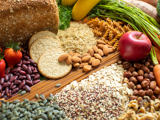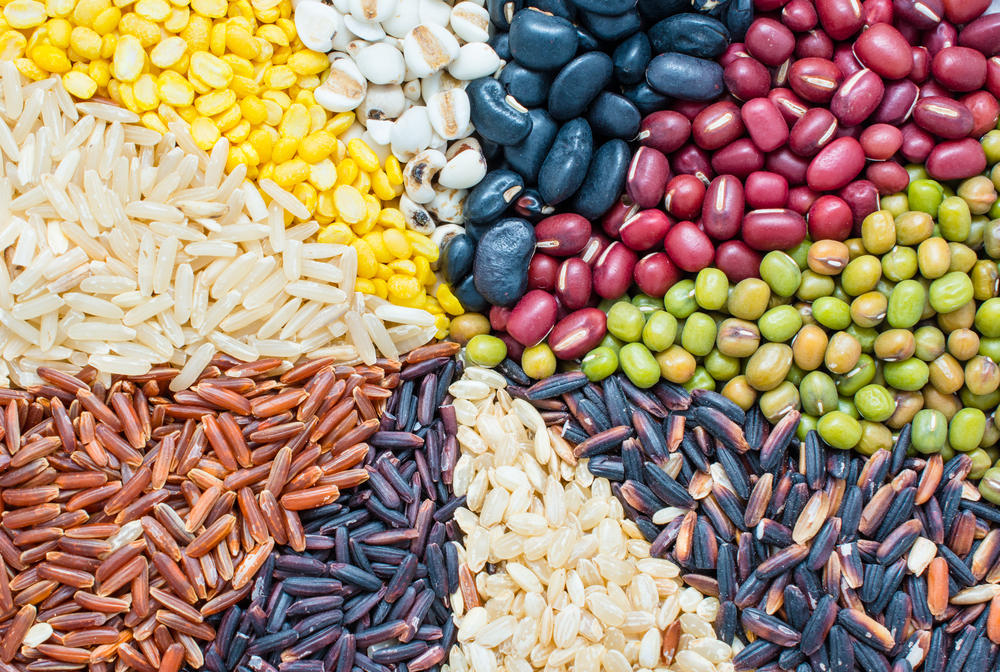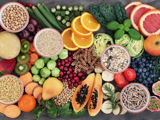What are starches?
Starches are carbohydrates found in a range of plant foods including grains like wheat, rice, barley, oats, rye, corn, and breads and potatoes.
Starches are digested and broken down to glucose, which enters the blood, stimulating the hormone insulin. In healthy people, the action of insulin and other hormones tightly controls blood sugar levels but in people with diabetes or pre-diabetes, blood sugar may become too high if not controlled by diet or medication. The glycaemic index (GI) shows the rate at which a carbohydrate containing food raises blood glucose levels. Choosing lower GI starchy foods, as well as looking at the total amount of carbohydrates eaten may be a helpful strategy for blood sugar control for people with type 2 diabetes, although it is important to remember that not all low GI foods are healthier choices.
Starchy foods are a key food group in food-based dietary guidelines from around the world. As a group, they make a significant contribution to intakes of fibre and micronutrients, according to data from the UK. Evidence shows that the quality of carbohydrates in the diet is important for health – in practice, this means choosing higher fibre and wholegrain starchy foods and fewer refined versions.
Digestion and absorption of starches in food
Starches are made up of long chains of glucose molecules and are found in a wide range of foods including cereal grains and starchy vegetables.
The structure of starch can affect how quickly it is digested. Some types, called resistant starches, are not broken down in the small intestine and are included in the definition of fibre. Digestible starches provide approximately 4kcal per gram.
When starchy foods are eaten, starch is broken down to glucose, which is absorbed into the blood. The levels of glucose in the blood are usually tightly controlled, although people with type 1 or 2 diabetes or pre-diabetes need to manage blood glucose levels to avoid hypo- or hyperglycemia.
When glucose reaches the blood, insulin is released, which allows cells to take up glucose to use for energy, or in the case of muscles and the liver, to store as glycogen.
Glucose is a key energy source for the cells of the body, particularly for the brain, nervous system and red blood cells. The rate at which glucose reaches the blood after eating starchy (or sugary) foods differs. The rate is measured by the glycaemic index (GI).
The glycaemic index (GI)
The GI is measured by giving people test foods and then measuring the levels of glucose in the blood compared to an equivalent amount of pure glucose. Glucose is given a score of 100 and then foods are ranked compared to this. The GI of selected starchy foods is shown in Table 1 below. A GI of 70 or more is generally considered ‘high’, 56-69 as ‘moderate’ and 55 or less as ‘low’.
The blood glucose response after a meal is influenced by both the GI and the amount of carbohydrate in a portion of a food. The glycaemic load (GL) concept was introduced to quantify the glycaemic effect of a portion of food. So, whilst GI is a measure of the blood glucose response to a portion of a food containing a fixed quantity of available carbohydrates, the GL considers both the GI and the amount of carbohydrate in a given food.
The GI (and GL) of a food is influenced by a wide range of factors. This includes the physical structure; the more compact the structure, the lower the glycaemic response as the particle stays intact for longer, slowing down the digestive process. Other factors include the fibre type and content, addition of oils or fats or the presence of organic acids, as from sourdough fermentation.
Table 1. The glycaemic index (GI) of selected foods (Source: Harvard Medical School)
|
Food
|
GI
|
|
White bread
|
75
|
|
Wholemeal bread
|
74
|
|
White rice
|
73
|
|
Brown rice
|
68
|
|
White spaghetti
|
49
|
|
Wholemeal spaghetti
|
48
|
|
Corn flakes
|
81
|
|
Wheat biscuits
|
69
|
|
Porridge
|
55
|
|
Boiled potatoes
|
78
|
There is evidence to suggest that choosing low GI foods can help manage blood sugar levels in the long-term (as measured by HbA1c – glycated haemoglobin, made when high blood glucose levels cause glucose to stick to haemoglobin in red blood cells) for people with type 2 diabetes. Evidence from prospective cohort studies indicates that a diet higher in GI or GL is associated with a greater risk of type 2 diabetes.
However, it’s important not to focus on GI alone – it’s also important to think about foods that are wholegrain and high in fibre. For people with type 2 diabetes, the quantity of carbohydrate consumed, rather than GI, has the biggest impact on blood sugar.
The GL of a food is the GI multiplied by the amount of carbohydrate in a portion, giving a more exact picture of the glycaemic effect of eating the food. Some foods, such as watermelon, may have a high GI but contain a small amount of carbohydrate and so have a relatively low GL.
Dietary requirements for starchy foods
Starchy foods are a key food group in food-based dietary guidelines from around the world and in the UK, they are the second largest group in the Eatwell Guide (after fruit and vegetables). To meet current nutrient recommendations, the Eatwell Guide recommends that these make up over a third of the food we eat (36.7%) and that we choose higher fibre wholegrain varieties, such as wholewheat pasta and brown rice, and leave skins on potatoes.
In dietary modelling carried out for the development of the Eatwell Guide, it was found that in actual diets, based on the National Diet and Nutrition Survey (NDNS), starchy foods made up about 27% of foods consumed. The modelling included looking at how consumption of foods would have to change to meet guidelines. The modelling calculated that consumption of starchy foods as a food group would have to significantly increase from 281g to 473g per day and higher fibre foods such as wholemeal breads and high-fibre breakfast cereals would have to increase the most.
Table 2. Amount of selected starchy foods eaten per day in actual diet versus Eatwell guide model diet (Scarborough et al. 2016)
|
Food
|
g/day in actual diet
|
g/day in Eatwell Guide modelling
|
|
All starchy foods
|
281g
|
473g
|
|
Brown and wholemeal bread
|
33g
|
83g
|
|
Potatoes
|
91g
|
173g
|
|
High-fibre breakfast cereals
|
20g
|
52g
|
|
White bread
|
49g
|
68g
|
|
Pasta
|
25g
|
35g
|
While starchy foods or ‘carbs’ may sometimes have a reputation for being fattening, its important to remember the quality of the carbs we choose – so looking to include wholegrains and higher fibre – and thinking about the portion size.
Ayela Spiro, Nutrition Science Manager, British Nutrition Foundation
In terms of nutrient intakes, starchy foods are major contributors to intakes of fibre and micronutrients. According to the NDNS, cereal foods as a group contribute 38% of fibre intakes in 19–64 year-olds and within this group the biggest contributors are ‘pasta, rice, pizza and other miscellaneous cereals’ (9%), white bread (7%), high-fibre cereals (6%) and wholemeal and brown breads (5%). In addition, potatoes contribute 10% of fibre intakes in this age group meaning that the starchy foods group provides nearly half of current fibre intakes. Starchy foods also make significant contributions to micronutrient intakes as shown in Table 3 below.
Table 3. Percentage contribution of starchy foods to micronutrient intakes among UK adults aged 19-64 years
|
Percentage of nutrient intake
|
Vitamin A
|
Riboflavin
|
Folate
|
Iron
|
Calcium
|
Magnesium
|
Potassium
|
Iodine
|
Selenium
|
Zinc
|
|
Pasta, rice, pizza & other miscellaneous cereals
|
6
|
4
|
5
|
7
|
7
|
7
|
4
|
3
|
11
|
8
|
|
Bread
|
1
|
4
|
12
|
13
|
15
|
10
|
4
|
3
|
9
|
9
|
|
Breakfast cereals
|
1
|
9
|
8
|
11
|
3
|
6
|
3
|
3
|
3
|
5
|
|
Potatoes
|
1
|
1
|
6
|
4
|
2
|
7
|
12
|
2
|
0
|
3
|
|
Total
|
9
|
18
|
31
|
35
|
27
|
30
|
23
|
11
|
23
|
25
|
Source: National Diet and Nutrition Survey, years 9-11 (2016/2017 to 2018/2019).
The nutritional benefits of starchy foods
The health effects of dietary carbohydrates have been hotly debated in recent years and, like any food or food group, getting definitive results on diet and health outcomes from research studies is challenging.
In this section, we look at some key reports and papers that have looked at the effect of starchy foods on health.
Carbohydrate quantities and health
In 2017, a publication from the Prospective Urban Rural Epidemiology (PURE) study hit the headlines by suggesting that high intakes of total carbohydrate were linked to a higher risk mortality and that intakes of total and saturated fats were linked to lower risk of mortality.
However, ‘high intakes’ in this study were very high; more than 60% of energy, reflecting diets in the countries included that are highly reliant on starchy staple foods. Intakes of carbohydrate in more affluent countries tend to be lower and in the UK are around 47% on average.
In 2018, another paper seemed to contradict these headlines, suggesting that both high and low intakes of carbohydrate were bad for health. This paper included an analysis of the Atherosclerosis Risk in Communities (ARIC) cohort in the US as well as a systematic review and meta-analysis of studies from 20 countries (including the PURE cohort). They found a ‘U-shaped’ relationship between carbohydrate intake and health; diets with both lower (less than 40% of energy) and higher (more than 65% of energy) levels of carbohydrate were associated with increased risk of mortality and reduced lifespan. The lowest risks were seen at intakes of carbohydrate at 50-55% of energy, which are consistent with dietary guidelines from around the world including the UK.
The analysis also found that the health effects of lower carbohydrate diets depended on what people replaced carbohydrates with. Replacement of carbohydrate with fats or proteins from animal sources increased risk of mortality but those from plant sources reduced risk of mortality.
SACN carbohydrate report
In 2015, the Scientific Advisory Committee (SACN) published its report on carbohydrates and health, which looked at all types of carbohydrate in the diet (sugar, starches and fibre) and produced revised recommendations for intakes of fibre (30g per day) and free sugars (less than 5% of energy). The report also concluded that existing recommendations that carbohydrates should provide 50% of energy should remain.
For starchy foods, no associations were found with intakes of starchy foods and coronary events or type 2 diabetes and no association was found between intakes of refined starchy foods and type 2 diabetes. For GI and GL, data from prospective studies, where researchers follow large cohorts over time, suggested that diets with a higher GI or GL were associated with a higher risk of type 2 diabetes. There were indications that there could be some other harmful effects including on blood cholesterol and blood pressure although evidence for these was limited.
For wholegrains, the report found an association between higher consumption of wholegrains and lower risk of cardiovascular disease, stroke, hypertension, type 2 diabetes and colon cancer, as well as evidence that wholegrain consumption may be associated with lower energy intakes.
For fibre, there was strong evidence for beneficial health effects. Find out more about fibre and health by reading our page on the science of dietary fibre.
Carbohydrate quality in healthy dietary patterns
Carbohydrate quality is increasingly a focus of dietary guidelines from around the world. Canada’s most recent guideline highlights wholegrains, alongside vegetables, fruit and protein foods as the key components of a healthy diet and the US MyPlate healthy eating model recommends that ‘half your grains should be wholegrains’.
A Carbohydrate Quality Index (CQI) of diets for use in research studies has been defined based on dietary fibre intake; GI; the ratio of total grains to wholegrains in the diet and the ratio of solid carbohydrates from drinks versus food. Researchers investigated this index as part of the PREDIMED-plus intervention study, published in 2020. This study looked at the effects of a lifestyle intervention based on an energy-reduced Mediterranean diet, physical activity promotion, and behavioural support for weight loss on primary prevention of cardiovascular disease (CVD) events in comparison with a control group. Over a year of follow up, the researchers found that most participants taking part in the intervention improved their CQI, consuming less refined cereal foods, fewer sugary drinks and less added sugars. This was associated with improvements to CVD risk factors including weight loss and reduced blood pressure and blood cholesterol.
Looking further at CVD risk, food-based guidance for prevention of CVD was published in Australia in 2021. This was developed with reference to recent guidelines from the US and Europe. The guidelines reviewed available evidence on carbohydrate quality including the glycaemic response and the content and type of dietary fibre. Alongside a whole series of recommendations on diet and lifestyle for prevention of CVD, they concluded that individuals should consider increasing their intake of high-quality carbohydrate, slowly digested low GI, fibre-rich wholegrain cereals and breads.
In relation to cancer risk, a systematic review of meta-analyses on associations between whole and refined grains and cancer was published in 2020. For total cancer mortality, seven meta-analyses of cohort studies showed that wholegrain intake was associated with 6% to 12% lower risk in comparison of highest versus lowest intake groups, and 3% to 20% lower risk for doses ranging from 15 to 90g per day. For site-specific cancers, meta-analyses showed that wholegrain intake was consistently associated with lower risks of colorectal, colon, gastric, pancreatic and oesophageal cancers. The results for refined grains were inconsistent as fewer studies included these and they included several types of food under their definition.
Low-carbohydrate diets and type 2 diabetes
The efficacy of low-carbohydrate diets for weight loss and management of type 2 diabetes has been a matter of much debate in recent years.
In 2017, Diabetes UK published a position statement on the use of low carbohydrate diets for people with diabetes, based on a review of the evidence by an expert group. Diabetes UK's conclusions were:
- Low-carbohydrate diets can be safe and effective in the short-term in managing weight and improving glycaemic control and cardiovascular risk in people with type 2 diabetes.
- People who chose to follow a low-carbohydrate diet should be supported to make changes to relevant diabetes medications and to monitor blood glucose to reduce the risk of hypoglycaemia.
- There is absence of strong evidence to recommend low-carbohydrate diets to people with type 1 diabetes.
- There is evidence that low-carbohydrate diets can affect growth in children and should not be recommended.
- Whether people choose to follow a low-carbohydrate diet or not, they should be encouraged to include foods with good evidence to support health. This includes fruit and vegetables, wholegrains, dairy, seafood, pulses and nuts.
- People should be encouraged to reduce their intake of red meat and processed meat, sugar-sweetened foods particularly sugar-sweetened drinks, and refined grains such as white bread.
Diabetes UK also provides consumer-facing information on a balanced, low-carbohydrate approach to eating for people who want to try a low-carbohydrate diet.
Low-carbohydrate diets for people with type 2 diabetes were also the subject of a joint report from SACN and Diabetes UK published in May 2021. A working group including members of SACN and members nominated by Diabetes UK, the British Dietetic Association, Royal College of Physicians and Royal College of GPs, reviewed existing evidence on the effect of following a lower carbohydrate diet on several risk markers and clinical outcomes for people living with type 2 diabetes, both in the shorter term (up to 6 months) and longer term (beyond 6 months). Based on four systematic reviews and meta-analyses, which included a total of 31 randomised controlled trials (RCTs), the working group concluded that:
- For bodyweight, there is no overall difference between lower and higher carbohydrate diets in the long-term (at or beyond 12 months)
- For fasting glucose, HbA1c and serum triglycerides, lower carbohydrate diets may have benefits over higher carbohydrate diets in the short-term (up to 6 months), but their longer term effects (beyond 6 months) are unclear, based on the evidence considered
- Evidence for other outcomes (such as total and high-density lipoprotein [HDL]-cholesterol) was inconsistent in both the shorter (≥3 to 6 months) and longer term (beyond 6 months).
The working group concluded that a lower carbohydrate diet can be recommended by clinicians as an effective short-term option (up to 6 months) for improving glycaemic control and serum triglyceride concentrations for adults living with type 2 diabetes and overweight or obesity. However, the working group recommended that individuals choosing a low-carbohydrate diet should include wholegrain or higher fibre foods, a variety of fruits and vegetables and limit intakes of saturated fats, in line with current dietary advice for the general population.
The working group also highlighted that weight loss is still the primary goal for improving glycaemic control and reducing the risk of cardiovascular disease, as most individuals with type 2 diabetes are living with overweight or obesity. The evidence on the effect of lower carbohydrate diets in adults without type 2 diabetes was not assessed, and so it is not known if these findings apply to the general adult population.
Low-carbohydrate diets and weight loss
There have now been several systematic reviews and reports looking at low-carbohydrate diets and a variety of different outcomes including weight loss, type 2 diabetes management and biomarkers of metabolic health such as blood pressure, blood sugar control and blood lipids.
Concerning weight loss, the evidence is broadly consistent that low-carbohydrate diets can be effective for weight loss, but that they are not superior to other types of weight loss diets, such as low fat or meal replacement approaches. For other outcomes, low-carbohydrate diets can also be effective, but again, not superior to other types of weight loss diet. Weight loss can improve biomarkers such as blood pressure, blood cholesterol and blood sugar and so, results from studies of low-carbohydrates may reflect the level of weight loss achieved rather than specific effects of reducing the proportion of carbohydrates in the diet. Some studies have found that very low calorie, ketogenic diets may have adverse effects on blood cholesterol and may also be harder to stick to. There are also some concerns about low fibre intakes on such diets and the potential impact this might have in the longer term.
The key to successfully losing weight and improving health outcomes is likely to be what works for an individual and what they can stick to, as achieving and sustaining weight loss requires long-term changes to diet and lifestyle. Whatever the type of diet, the quality of carbohydrate included is important for health and should be emphasised when providing dietary advice.













